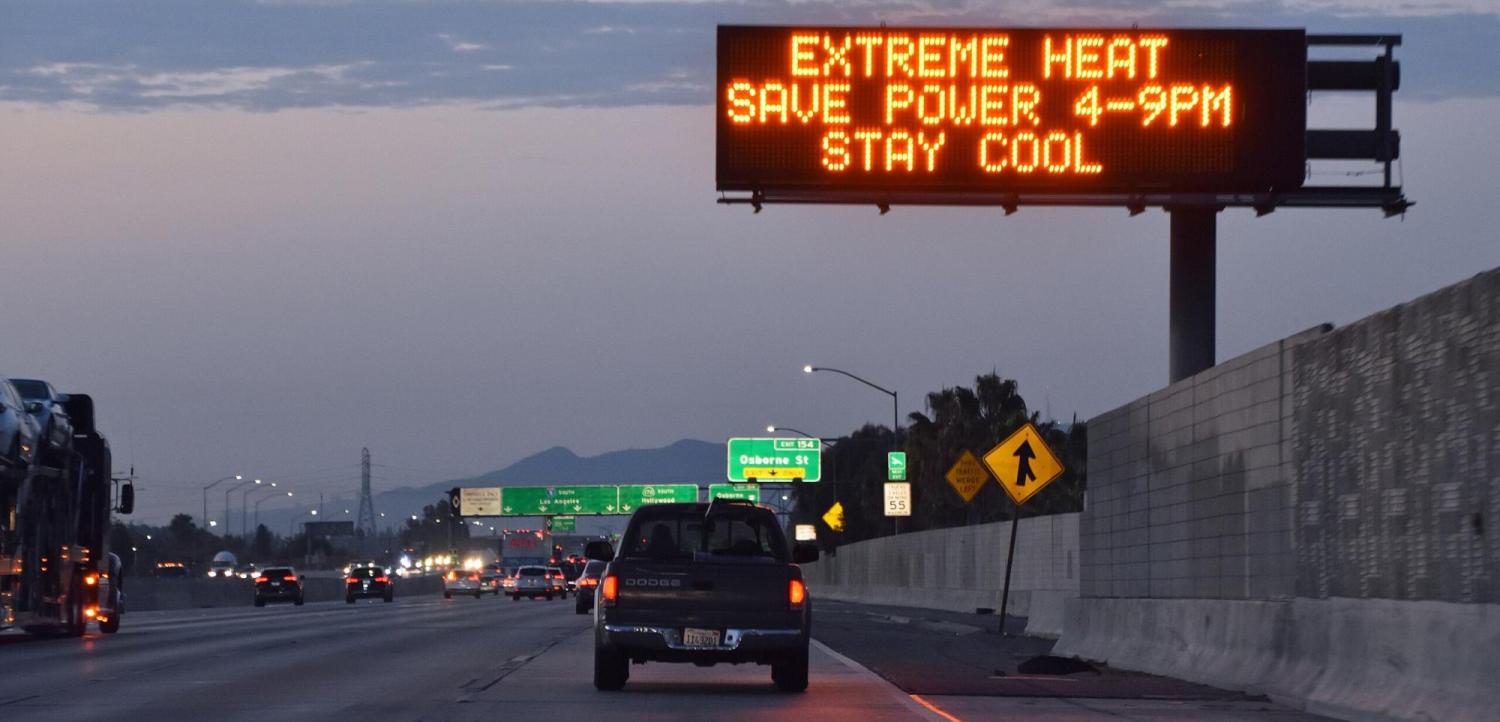
A heat wave strikes Los Angeles County, California, in 2022. (Credit: CC photo via Wikimedia Commons)
The numbers are staggering: As of Wednesday, Phoenix had hit 20 straight days at or above 110 degrees Fahrenheit (43 degrees Celsius); El Paso, Texas, had sweltered for 33 days above 100 degrees Fahrenheit; Las Vegas was under an excessive heat warning, expected to reach a scorching 113 degrees this week.
Even Colorado, which has enjoyed a relatively cool early summer, was bracing for mid- to high- 90s starting Sunday and stretching through next week.
Excessive heat can sicken and, in some cases, kill, said Colleen Reid, an assistant professor of geography at the University of Colorado Boulder. During last summer's heat wave in Europe, 62,000 people perished. Yet the threat heat poses is often underestimated.

Colleen Reid
"People tend to say, 'Oh it's hot. I'm used to being hot.' But some studies say that extreme heat actually kills more people in the U.S. every year than any other weather disaster," said Reid, who studies the health impacts of extreme heat and wildfire smoke.
CU Boulder Today spoke with Reid about how heat impacts health, who is most vulnerable, and what people can do to protect themselves.
Heat waves are deceptively dangerous. Why?
The interesting thing about heat is that you don't see it. You look out your window and you don't see a tornado or a hurricane or a fire. It looks normal, and without clear imagery, it's tough to get people to understand the severity of the threat. A lot of people don't take precautions.
Temperatures around the country are all over the place right now. Is this the new normal?
We will definitely see more of this in the future. Already, we are seeing hotter, longer and more frequent heat waves than we did 10 or 20 years ago, and that is exactly what was predicted by the climate scientists. The projections are, unfortunately, suggesting it will get worse.
What goes on inside your body when exposed to extreme heat?
Your body tries to cool off as best as it can, so you sweat more. When you sweat, you lose electrolytes, and you need those electrolytes for lots of different bodily functions. You are also losing fluid, so you can get dehydrated, which can cause confusion and inhibit the good judgment it takes to stop and cool off. If you can't cool off, your insides essentially cook. We know from research that people are more likely to have heatstroke and show up in the hospital or the emergency department with electrolyte imbalance or kidney problems during a heat wave. More than 700 people die in the U.S. each year from heat-related illness. (By comparison, about 88 perish in floods and 68 from tornadoes).
Are certain populations particularly vulnerable?
People with kidney disease, as kidneys are very affected by the heat. Some prescription medications (including psychotropics, diuretics and medications for Parkinson's disease) also interfere with body temperature regulation. The elderly, as their bodies have trouble thermoregulating just due to the natural aging process. Similarly, really young children, particularly those too young to be able to use words to explain their discomfort. And, of course, anyone who does not have access to places to cool off.
Are there socioeconomic factors at play here, too?
Yes. We know from my research and that of others that homes that have air conditioning are more likely to be homes owned by wealthier families. And even when people have an air conditioner but are struggling to pay their electric bill, they don't always turn it on. People with lower economic means also tend to live in communities that have less tree cover and fewer parks, and areas with vegetation are cooler than areas filled with concrete. It's also been documented that even when you control for income, predominantly whiter communities have more green space, and Black and brown communities tend to have less green space. There's an environmental injustice there. Cities are getting hotter and hotter, and the most vulnerable individuals, the people least likely to have air conditioning, are also the ones least likely to have a park nearby to cool off in.
Keeping cool
Warning signs of heatstroke vary but may include the following, according to the Centers for Disease Control and Prevention:
- An extremely high body temperature (above 103°F)
- Red, hot and dry skin (no sweating)
- Rapid, strong pulse
- Throbbing headache
- Dizziness
- Nausea
- Confusion
- Unconsciousness
How can individuals protect themselves?
When you hear there's an extreme heat warning, take note and modify what you're doing that day or at least when you're doing it. If you're going to exercise outdoors, try to do it before the temperature gets too hot. As far as work goes, Colorado has a law to protect agricultural workers by requiring their employers to provide shade and water breaks. But not all outdoor workers - think about construction workers or roofers - have those laws in place in Colorado. If you must be out in the heat, drink lots of fluids, including electrolyte drinks. Don't drink alcohol or other things that dehydrate you. Seek shade when you can.
How can society prepare for a hotter future?
We need to be doing everything we can to stop emitting fossil fuels to try and slow down climate change. But that's going to take a long time to have an effect. Meantime, we need to protect people's health now and be ramping up for the fact that it's going to get worse in the future. We need to think about shifting when the workday is in the hottest times of the year. Already, in Arizona, some construction is done at night. We need to think about shifting when sports practices are for kids. And we need to have plans in place to help vulnerable individuals when a heat wave strikes.
How do we help the most vulnerable people?
Cooling centers are great, but you need to get the word out that they exist and you need to provide transportation to them, because a lot of the individuals who need them most do not have their own vehicles. These centers also need to allow for pets, because people don't want to leave their pet suffering in the heat. There's a lot of people who just don't want to go to a community cooling center, but if you said they could go to a movie theater or to the library or to the grocery store or a mall and just spend some time to cool their core body temperature down, they might go for that. There are also efforts to create networks where people check on their elderly neighbors who live alone and may be overheating and not realize it. Most importantly, we need to recognize that extreme heat can kill, and we need to take it seriously.






